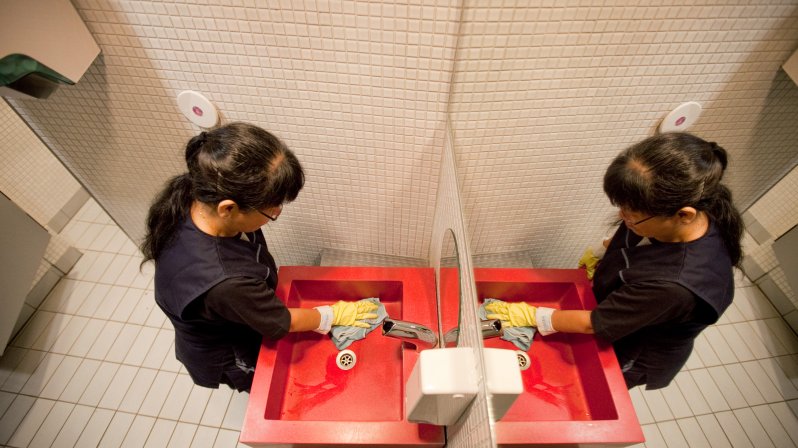The coronavirus epidemic has further ramped up the pace of work in the cleaning sector
The coronavirus epidemic has changed the pace of work and working methods in the cleaning service sector. There is constant pressure to prevent the spread of the virus with thorough, careful cleaning. Shop stewards point out the importance of safe working practices, information flow and protective equipment.
A round of phone calls to shop stewards in companies in the cleaning sector reveals that the coronavirus epidemic has meant changes to everyday routines for workers in the sector: disinfectants are being used much more on cleaning jobs and traditional maintenance cleaning now includes a longer list of duties. Moreover, new instructions from employers and the authorities have to be followed closely, induction takes time, and it is more important than ever to be careful and professional in the job.
Erja Killström from Lassila & Tikanoja is regional head shop steward for Southwest Finland. She says that the coronavirus has led to growing demands. In her opinion it is nonetheless a shame that this is not properly reflected in workers having more time to do cleaning work.
“The same location which had to be cleaned in a certain amount of time before the outbreak now has to be cleaned in the same time but with the new requirements. The pressure is on. People are cleaning thoroughly and carefully but at the expense of their own coping”, she says and continues
“In terms of allaying workers’ fears about the coronavirus situation I think it’s good that our employer has set up work groups around Finland specifically for corona cleaning. They do things like deep disinfecting and the employer steps in and supports them in this specialised work”, she says.
Employees’ wellbeing put to the test
PAM has repeatedly criticised the negative effects that continual tendering in the cleaning and sanitation sector are having on workers’ wellbeing and coping at work.
Shop stewards believe that with the coronavirus crisis the situation could escalate. Customers want services as cheaply as possible and companies in the sector are increasingly having to reprice contracts. This also means employees are increasingly worried whether their work input is enough in this time of crisis.
“The coronavirus crisis has impressed on workers the importance of proper working practices and training for demanding jobs in the sector. Every one of us wants to do their work as well as possible and that’s why guidelines are followed very closely and professionally”, says Outi Missi, regional head shop steward from RTK-Palvelut in Lahti.
Her colleague Sami Mäkinen from Pori, who is consulting head shop steward at RTK-Palvelut, emphasises that employees also feel safe if they have proper protective equipment and operating procedures to prevent cleaners becoming exposed to the virus.
“We have received breathing masks and protective goggles. At cleaning locations it’s not always possible to wash hands. That’s why it’s important for employees to have hand sanitiser and protective gloves”, Mäkinen says.
Even in an emergency cleaning work shouldn’t put anyone’s own health at risk.
“Fortunately our employer has acted on the problems raised by employees and taken responsibility for employees’ occupational safety”, Mäkinen says.
Information is needed at the “shop floor”
In work that is done on the customer’s premises, employees don’t always have the chance every day to see their supervisors or colleagues at the workplace. SOL’s shop steward Janne Forsman demands the right of workers to get guidance and advice even in times of crisis. Getting accurate, up-to-date information on time reduces the feeling of insecurity.
“The impact of coronavirus is of course creating fears. New guidelines come out almost daily. Getting information on time to where the cleaning work is actually done and to the employees themselves has sometimes been challenging. Not everyone has access to the company’s own email, for example. Interaction and sharing coronavirus information between employer and employee is more important as time goes on”, he says.
The round of phone calls to shop stewards shows that at least some employers have shown understanding for the questions raised by cleaners. Also, the ability of workers in risk groups to do cleaning work during the coronavirus epidemic has been taken into account by swapping cleaning locations, for example.
Worries about outlook for incomes
During the interview some shop stewards said that doing coronavirus cleaning has been on a voluntary basis and that employers have refrained from issuing warnings to workers for refusing to do cleaning because they were afraid of contracting the virus. These sorts of positive examples by employers are to be commended.
Based on the interview with shop stewards it seems that fears of coronavirus infection are not that widespread at cleaning sector workplaces. The reason could be that cleaning work is always done in different and challenging conditions involving things like bodily waste and other human discharge.
A bigger fear that shop stewards say workers in the sector have is for their own incomes. What if the coronavirus crisis just goes on and lay-offs lead to large-scale redundancies or bankruptcies? What will life look like for cleaners then?



